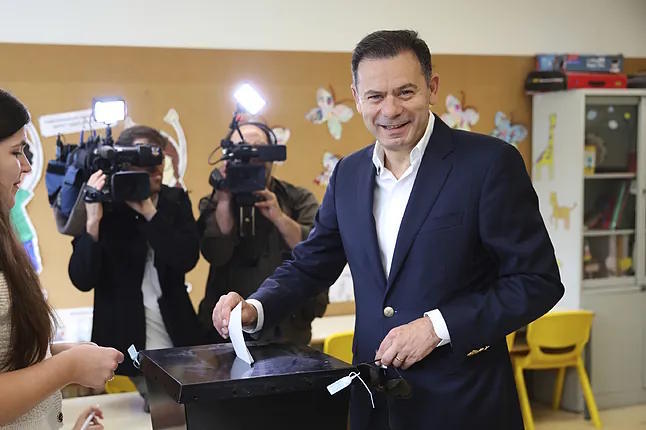Political earthquake in Portugal. The two-party system that has dominated the Portuguese scene since the Carnation Revolution collapsed yesterday like a house of cards. The repeat of the legislative elections a year after the last ones has yielded a completely different result. Luís Montenegro, the center-right prime minister, won clearly but without achieving an absolute majority even by adding the seats of the Liberal Initiative, with which he could form a coalition. With 99% of the votes counted, the ruling coalition, Democratic Alliance (DA), had obtained 32.16% of the votes, with a nine-point lead over the second most voted party.
But the surprise came from behind. The radical right of Chega, which last year surged to 18% of the votes, took a giant leap this year. According to the data with 99% of the votes counted, the Portuguese populist right tied with the Socialist Party (PS) and almost became the second political force in the country, with 22.67% and 58 seats.
"Chega has killed bipartisanship," declared its leader, André Ventura, in the first assessment he made of these results. His party, stated the populist leader, who has advocated for the expulsion of all illegal immigrants or the rejection of the Roma, is now ready to "be an alternative for government."
Chega already won in 2024 in the Algarve. This year, it remains in its stronghold in the South as the leading force and adds at least the regions of Beja or Portalegre, where it also won yesterday's legislative elections.
Meanwhile, the historic Portuguese Socialist Party (PS) plummeted to tie with Chega, becoming the big loser of the night. The same party that until two years ago had an absolute majority in the Assembly of the Republic with António Costa at the helm collapsed to 23.39% of the votes - just above Chega - and achieved its worst result in 38 years, with 58 deputies.
You have to go back to 1987 to find a Portuguese Socialist Party that achieved a 22-23% in the legislative elections. The choice of Pedro Nuno Santos as the new leader and successor of António Costa has not had the desired effect. His image as impulsive and even left-wing radical has worked against him in a country now leaning heavily to the right.
In addition to the 226 deputies elected in Portuguese territory yesterday, the four from emigration abroad will have to be added, whose count has not yet begun. If the result of these constituencies were the same as last year, Chega would have two more deputies, and Democratic Alliance and the PS one more each, with Chega leading the opposition with 60 seats against the PS's 59.
Furthermore, DA (86 seats) and Liberal Initiative (nine) will fall far short of the absolute majority (116) even if DA wins the emigration count and adds two or more deputies.
The election results confirm that the citizens "have reinforced their confidence in Luís Montenegro," as stated last night by the DA spokespersons, despite the suspicions of conflicts of interest with which the campaign began.
With a greatly weakened PS, Luís Montenegro will have no difficulty in becoming prime minister and starting his government program again in a few weeks. The new leader of the opposition will be the media-savvy André Ventura, who will undoubtedly be a thorn in the government's side from the radical right.
Last night's results confirm that the gamble Montenegro took with the doomed vote of confidence has resulted in a resounding success for the center-right. The move was risky.
After being harassed by the opposition, which presented two failed motions of censure and was going to set up a commission of inquiry into the alleged conflict of interest between his private activity and his position as prime minister, the head of government decided to present a vote of confidence that would lead to a certain call for elections.
Finally, the Portuguese, increasingly tired and distant from politics, have decided to give him more time to implement the policies that he has only just begun in his 13 months in office.
The elections were called under the shadow of the Spinumviva case - the company that the prime minister created when he was not yet in politics - but the right has managed to turn the electoral campaign around. Instead of being monopolized by the prime minister's problems, Democratic Alliance managed to focus on the issues that benefited them the most - both DA and Chega - and push aside accusations of alleged corruption.
Furthermore, not even the issues that most concern and afflict the Portuguese, according to surveys, have been excessively discussed: the enormous difficulty in buying or renting a home, the deterioration of public health, or the lack of teachers in education. Above these topics, DA and Chega imposed in the campaign debates the concern for security, immigration, or taxation.
The AD candidate has toughened his proposals to control immigration and has placed security as one of his priorities. Finally, he cited the tax cuts approved in this brief term to promise more tax reductions in the future, as well as extra payments to pensioners when the economic situation allows it.
